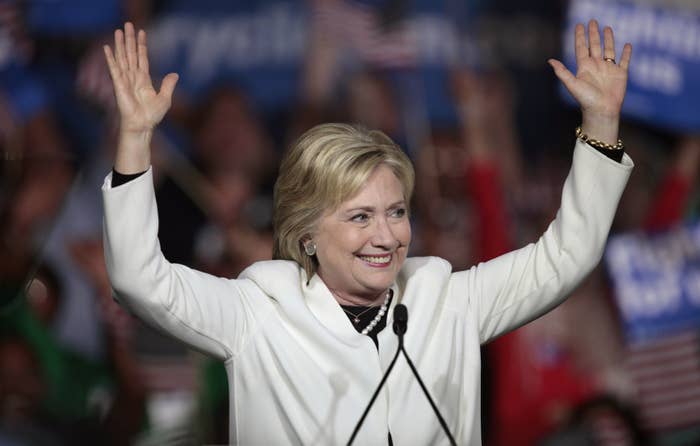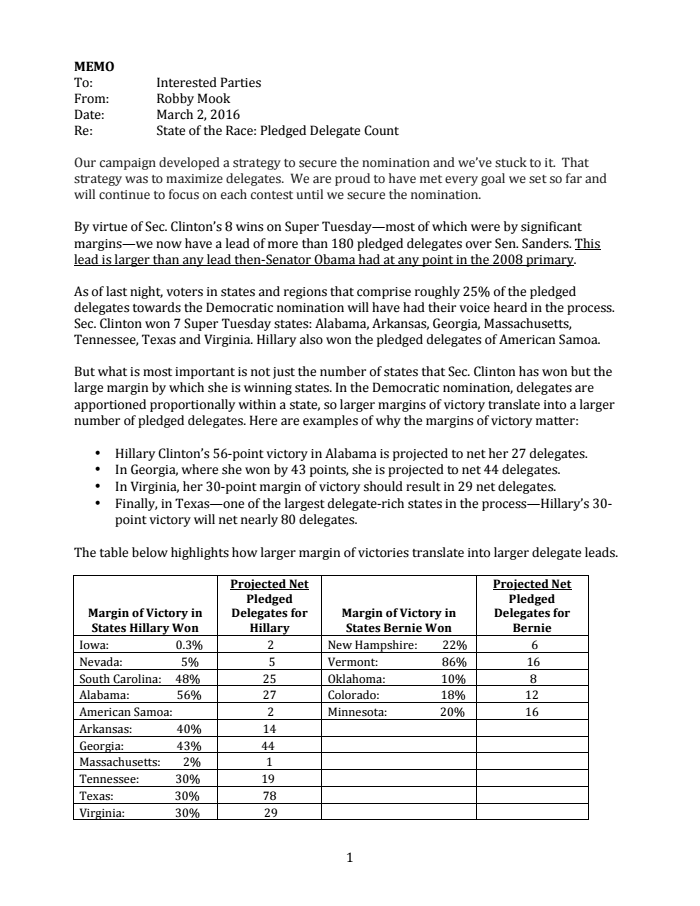
MIAMI — As the final tallies came in on Super Tuesday, even after Hillary Clinton had already secured massive victories among people of color in the Southern states, campaign aides were still keeping special watch over results from the very rural and very white wedge of land that makes up Virginia’s 9th Congressional District.
The southwestern corner of the state, encompassing 20 full counties and parts of two others, is comprised almost exclusively of white voters. And Clinton — after faltering early against Bernie Sanders in mostly white states like Iowa and New Hampshire — appeared to be winning.
If she could hold her lead there, aides argued inside the dark Miami event space where the candidate held her victory rally, it would be evidence of a broadening, diverse, November-ready Clinton coalition.
By night’s end, Clinton clinched seven states, one U.S. territory, and a lead of more than 180 pledged delegates over Sanders, campaign manager Robby Mook noted in a four-page memo released by the campaign on Wednesday. The delegate margin, Mook argues, is larger than any Barack Obama had in the last Democratic primary — making it “increasingly difficult and eventually mathematically impossible for Sanders to catch up.”
But on Tuesday, aides seemed particularly interested in places like Virginia’s 9th District, where they saw signs of growth in their base of older voters, women, and people of color. Clinton ultimately won the area, and by a margin of nearly 10%, according to AP results in the district’s 20 counties.
“We’re very encouraged to see that not only is she performing well in the places that she did all along, but we’re seeing good results in rural, largely white parts of the state of Virginia,” said campaign spokesman Brian Fallon, who huddled with reporters here after Clinton’s speech to discuss Super Tuesday results.
The “meaningful development,” he argued, was as much a promising sign for future Democratic contests, such as in Rust Belt states like Ohio and Michigan, as for the general election.
“That’s a good indication that we are broadening the coalition that we built in the first four states,” Fallon said. “We have the makings of a broad-based, diverse coalition that could not just power her to the nomination, but also make for a winning coalition in a general election.”
(Virginia's 9th District is not without its complications: Once Democratic, the district has leaned Republican the last few cycles — and in a potential general election against Trump, who did well in there with significantly higher turnout, Clinton may face difficulties with Rust Belt voters while performing better with other voters.)
The campaign moves into the next set of contests — held on March 5, March 8, and March 15 — with a strong Super Tuesday showing among voting blocs already supporting Clinton in the Democratic primary. Where Obama in 2008 claimed young voters, liberals, and people of color during the Democratic primary, Clinton appears to be building a base of older voters, people of color, and women. Across those states, black voters supported Clinton widely. (In Alabama, the margin was as large as 93% to 5%.) Clinton also did better with Latino voters, particularly in Texas.
Fallon acknowledged that the campaign has “room to grow,” particularly among young people, who have rallied in early contests behind Sanders and the anti-Wall Street political revolution at the center of his campaign. Clinton has refined her pitch to young people, promising to be “for them,” even if they aren’t “for her” right now. Campaign aides hope to grow the support they’ve already seen among young people of color. “We want to expand and build off of that,” Fallon said.
In the campaign memo released Wednesday, highlighting the vast margins in Southern states, Mook argues that Sanders can not recover from the delegate lead Clinton has already amassed. Through strategic targeting, Mook says, Clinton may, for instance, be able to claim more delegates from just one congressional district, Alabama’s 7th, than Sanders will from his victory in the state of Oklahoma.
Clinton aides questioned Sanders’ larger strategy, saying the Vermont senator has not been able to expand his support among people of color — even in states such as South Carolina, where he spent $2 million on ads and sent 200 paid staffers. (Clinton won by a nearly 50-point margin, and 68 points among black voters.)
Ahead of Super Tuesday, the Sanders campaign targeted five states as must-wins — Vermont, Minnesota, Oklahoma, Colorado, and Massachusetts — ceding the most diverse states to Clinton. “You can’t win the nomination writing off the most diverse states,” said Fallon. “If you’re seriously going to vie for the Democratic nomination, you need to be able to win states like here in Florida — and there’s not been a result yet where the Sanders campaign has won in a state that gives you confidence to think that they will seriously vie in a state like Florida."
"So that’s just true of the Democratic nomination," Fallon said, "to say nothing of the coalition you would need in a general election.”
Sanders aides recognize the problems they face going forward. The morning after Super Tuesday, at a breakfast with reporters, top strategist Tad Devine said the campaign would be working harder to introduce Sanders to people of color in the South. "We think we can do a lot better, and this is why: because Bernie has an incredible personal story to tell about his activism in the civil rights movement,” Devine said. “We think that as they get to know him better — understand where he comes from and what he's saying — we think we're gonna do better.”
Still, in the same breath, Devine also said the campaign is looking forward to contests in the Midwest — friendlier terrain for Sanders. “The experience of communities in places like Michigan will perhaps make Bernie's message on economics a much more powerful and resonant message,” he told reporters.
On the other side, Clinton aides see an important difference in the way the two campaigns are approaching voters across the map.
Put by Fallon: “We are running a truly national campaign,”
Evan McMorris-Santoro contributed reporting from Vermont.

